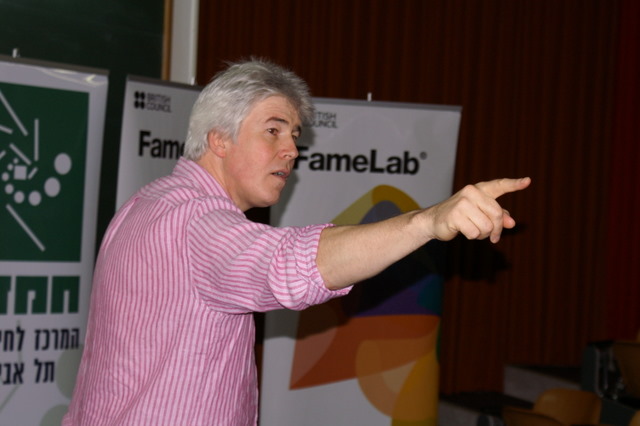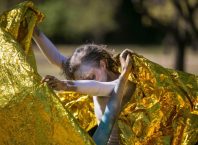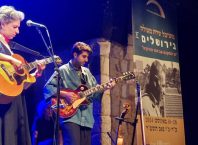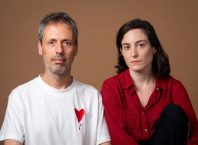
“All you need is love.” Lennon/McCartney 1967
The Beatles were right – love is all you need – Malcolm Love. The communications expert flew in to Tel Aviv from the UK to conduct a one-day master class in science communication for the FameLab 2010 finalists. For many of these young scientists, this is their first encounter with the field of communications. On May 5th they will each give a 3 minute presentation of their research before the FameLab judges and the general public at the Hemda Centre for Science Education in Tel Aviv. The winner of the competition will represent Israel at the FameLab competition at the Cheltenham Science Festival.
Skeptics may well wonder how much can be learned about communication in a single day, just as one might wonder how much science can actually be conveyed in the 3 minute FameLab talks. Midnight East observed Malcolm Love sharing his professional secrets in an afternoon session with the Famelab contestants.
There are no tricks, gimmicks, bells, or whistles. Love’s secret: passion and hard work. Covering everything from using your hands while talking (good – it animates your face) to how to prepare notes (don’t – prepare a talk by talking, use at most three words written in thick marker on a sheet of paper to jog your memory) his complete engagement with the topic and his students was mesmerizing. Although a one-day workshop cannot convey the entire body of knowledge nor the skills acquired in Love’s years of media experience, one certainly emerges with an enhanced understanding of the different media, their underlying principles of operation and a basic approach to interaction with the media.
Anyone who has been fortunate enough to study with an excellent teacher knows that it is the person that leaves the most powerful impression on our minds, influencing our understanding of the subject through his or her personality. Malcolm Love is clearly an excellent speaker, with a vast reservoir of knowledge that enables him to ask insightful questions on almost any topic from fusion to piano lessons. Like many media professionals, he possesses a charm and ease of manner, combined with a ready sense of humor and, yes, devastating good looks. But Love stands out from the crowd as an attentive and compassionate listener.
Unlike many media coaches who encourage speakers to overcome their nervousness by imagining the audience naked or in their pajamas, Love recommends a different approach, encouraging his students to speak to an audience (whether present or represented by the video camera) as if they were talking to “one or two people you know and like.” Rather than employ distancing mechanisms, his emphasis is on empathy, saying, “Try to put yourself in the place of the audience from the very beginning. Respect the audience, think about them.” Yet he does not attempt to sugarcoat or deny the working principles of the media, reminding the students that in an interview situation they can never assume that anything is off the record and that a journalist will always leap at the “most interesting bit.”
At the end of this intense day of teaching, Love was generous enough to linger for a few questions with Midnight East. When asked how he maintains the balance between his dual, and possibly conflicting, roles as independent producer and media skills trainer, Love acknowledged the potential conflict with a colorful image: “Poacher and gamekeeper” before going on to explain that he keeps the work of producer and teacher “completely separate.”
“I try to honor the project,” said Love, “when I am creating a program I think like a producer, when I am training people I honor the project. I do everything to enable people.”
One has the sense that his work in the field of science communication, and Fame Lab in particular, is more than just another job for Love, and he concurs, saying, “I get enormous pleasure and fulfillment out of enabling people. I have always been something of a therapist. Not a hard-headed media guy. I’m not interested in exploiting or using people as a means to an end. My instincts are supportive.”
Love began his career in neither media nor science, but as a minister. Asked to comment on his career path, he says: “I came from a very religious family, but was increasingly less happy with dogma. I consider myself a devout skeptic (the title of a series he produced for the BBC). I’m interested in all the big religious questions – human existence, what happens to us after we die, is the struggle worth living for? I have no idea what the answers are…I’m interested in the honest search.”
“I was interested in science as a small child, attracted to the element of certainty. I may well have been a physicist had I studied science rather than theology.”
Why has he devoted so much of his time and energy to science communication? Love was eager to explain:
“I genuinely think it would be a good thing for the world if scientists are better able to communicate with the rest of the community. It is good for democracy, for encouraging dialogue; even in countries that are not democratic it helps inform debate. Where should public money go? It is essential for our economies. There is a perceptible, frightening, falling off of people studying engineering, physics and math, particularly in the West. It can inspire more young people. The world’s biggest problems need the urgent attention of scientists – climate change, hunger…We are culturally impoverished if we don’t bring science into the heart of the community.”
It is perhaps not surprising to learn that Love is “Very impatient with shallowness of media.” When asked to describe the qualities a good journalist should possess, Love said, “My heroes are some of the big guns. James Cameron [British journalist 1911 – 1985] looked long and hard at a situation with a compassionate mind. A journalist should find the most significant human details and bring it to life for people who weren’t there to see and experience it. Cameron described the nuclear testing at Bikini Atoll: ‘It was not a bang, it was a rumble, not overloud, yet it thudded into all the corners of the morning like a great door slammed in the deepest hollows of the sea.’[Cameron’s article on the detonating of the first atom bomb in a series of nuclear testing on July 1, 1946]
As for the position of neutrality often claimed for journalism – Love dismisses it, saying, “It is philosophical nonsense to say that a person can be neutral – everybody has to stand somewhere. All of us are busy making this world a better place – or we’re not. If you think you’re standing in a neutral place, you are fooling yourself.”
An afternoon spent in the company of Malcolm Love was both educational and inspirational for Midnight East. As for the contestants of Fame Lab 2010, the public is invited to check out their presentation skills on Wednesday, May 5th at the Hemda Center for Science Education, 7 HaPardes Street at 19:00.
AYELET DEKEL





